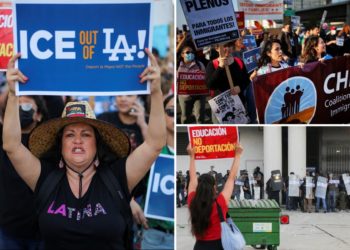Just because Kilmar Armando Abrego Garcia is back on U.S. soil to face criminal charges after being wrongfully deported to a prison in El Salvador does not mean that the Trump administration’s troubles in the monthslong civil case have come to an end.
On Sunday, lawyers for Mr. Abrego Garcia in the civil case filed blistering court papers arguing that even though the White House had finally complied with an order to return their client, the judge overseeing the case should still pursue contempt proceedings against Trump officials. The administration, the lawyers wrote, had spent much of the past three months “engaged in an elaborate, all-of-government effort to defy court orders.”
The papers, filed in Federal District Court in Maryland, where Mr. Abrego Garcia’s family first filed suit in March to force the government to bring him back, had equally fiery words for the federal criminal indictment that was filed against him in Nashville on Friday. The indictment accused Mr. Abrego Garcia of taking part in a yearslong conspiracy to smuggle thousands of undocumented immigrants across the United States as a member of the violent street gang MS-13.
In their court papers on Sunday, his lawyers in the civil case said that the White House’s evident ability to bring Mr. Abrego Garcia back to the United States to face criminal charges put the lie to repeated claims by administration officials that they were unable to get him out of El Salvador at all. The lawyers also framed the indictment itself as the administration’s “latest act of contempt,” accusing the Justice Department of starting to work on it only while the department was “under threat of sanctions” for having violated orders from Judge Paula Xinis, who has been handling the civil case from the start.
“Two things are now crystal clear,” the lawyers wrote. “First, the government has always had the ability to return Abrego Garcia, but it has simply refused to do so. Second, the government has conducted a determined stalling campaign to stave off contempt sanctions long enough to concoct a politically face-saving exit from its own predicament.”
The filing came in response to a request to Judge Xinis from the Justice Department to pause all of the proceedings in the civil case as department lawyers prepared a motion to dismiss it altogether.
That request was made on Friday evening, shortly after Attorney General Pam Bondi announced the indictment at a news conference. At the conference, her top deputy, Todd Blanche, said that Mr. Abrego Garcia’s return to face the criminal charges should render moot the civil case that had as its central goal bringing him back to U.S. soil.
But Mr. Abrego Garcia’s lawyers in the civil case argued that regardless of what happened in the criminal case, Judge Xinis still had the authority to punish the administration for its recalcitrant behavior in the past few months.
“Until the government is held accountable for its blatant, willful and persistent violations of court orders at excruciating cost to Abrego Garcia and his family, this case is not over,” the lawyers wrote. “The executive branch’s wanton disregard for the judicial branch has left a stain on the Constitution. If there is to be any hope of removing that stain, it must start by shining a light on the improper actions of the government in this tragic affair and imposing meaningful remedies.”
Mr. Abrego Garcia’s lawyers in the civil case are particularly eager for it to continue because just last week, Judge Xinis gave them the go-ahead to file a formal request for sanctions against the administration. That request is, for now, scheduled to be submitted on Wednesday.
While it remains unclear for the moment how Judge Xinis will proceed, a road map of sorts was recently laid out for her by another federal judge handling a different case arising from President Trump’s aggressive deportation agenda.
In April, that judge, James E. Boasberg, issued a ruling in Federal District Court in Washington threatening to open contempt proceedings against the administration for having violated his order to turn around two planes carrying a group of Venezuelan immigrants to El Salvador. Judge Boasberg said that he had the authority to begin the high-stakes contempt investigation even though the Supreme Court had struck down the initial order that he determined had been violated.
He wrote that the Supreme Court’s decision “does not excuse the government’s violation,” adding, “It is a foundational legal precept that every judicial order ‘must be obeyed’ — no matter how ‘erroneous’ it ‘may be’ — until a court reverses it.”
Alan Feuer covers extremism and political violence for The Times, focusing on the criminal cases involving the Jan. 6 attack on the Capitol and against former President Donald J. Trump.
The post Deportee’s Lawyers Push for Contempt Proceedings Despite His Return appeared first on New York Times.




